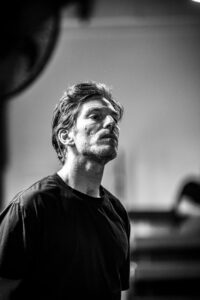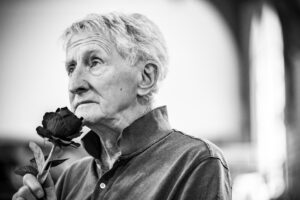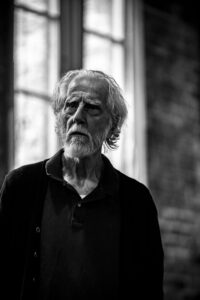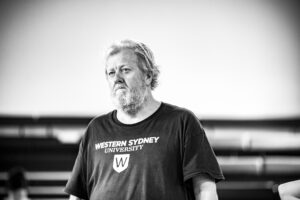When director Damien Ryan approached actor Liam Gamble to play Richard III, Gamble was unfamiliar with both the historical figure and the Shakespearian character. After investigating him, he was taken by this “badass guy” and duly auditioned.

“One of the reasons I cast Liam was the searing honesty of his audition,” says Ryan, who enjoyed an actor coming to the role without the usual baggage of how Laurence Olivier or Ian McKellen had performed it. Having cerebral palsy, Gamble approaches the disabled Richard from a unique perspective. “I’ve been testing different ways of portraying his disability with my walk and everything else,” he says. “But I find just being myself is just more liberating than giving myself an extra deformity.”
This Richard III is part of an eight-and-a-half-hour cycle of Shakespeare’s eight history plays, which Ryan has dubbed The Player Kings. He points to the difference made by the play following the depiction of the young Richard in Henry VI Part Three. “When you connect Henry VI to Richard III,” he says, “the pressure on him to be just a charming comedian comes off a little bit, and you get a darker, more frightening reality to this boy. That’s what Liam pulls off.”
The scene in which Richard woos Anne is often played for laughs, whereas Ryan says that Gamble “plays it like Romeo; plays it as a boy desperate to be loved, desperately in love, and the scene suddenly makes powerful sense… It’s wonderful to see an actor who’s just trying to come at the truth of the thing.”
Richard’s opening soliloquy (“Now is he winter…”) is about his relationship with his own “unfinished” body. “When you watch Liam do that with such truthfulness,” comments Ryan, “it is stunningly compelling in a way that watching someone pretend to talk about those things is not… Traditionally big alpha male stars play roles like Richard III, and that’s precisely what he is not as a human being. He’s hated by everyone because he has a physical deformity.” Gamble’s depiction, he says, has “a shabby, dangerous, incredibly truthful charm to it. It’s not a Richard that I’ve seen before, and I find that really intriguing.”

Gamble doesn’t think such roles should now become the exclusive province of disabled actors, but does submit it’s “good to let us have our time in the sun… I love to work. So if I can have the opportunity to play these characters, I’m going to absolutely fight for that.”
Although Ryan’s company, Sport for Jove, has presented the history cycle before, this time the plays have been cut and spliced quite differently, and employ a smaller ensemble with an older average age, so the actors have more experience with the language.

“Once you get people like Peter Carroll and John Gaden on board,” Ryan says, “then others start flocking to it because they’re so loved and cherished.” The cast also includes Sean O’Shea as Richard II, Gareth Davies (Henry IV), Steve Rodgers (Falstaff), Katrina Retallick and Christopher Stollery, and everyone entered the eight-week rehearsal period with lines memorised. “That old myth that actors who know the text will get caught in a pattern is just rubbish,” Ryan insists. “The more familiar you are with Shakespeare, the more you’ve rolled it around in your mouth, the more elastic and liquid it will become on the floor, and it’s got to be a second language to you.”
Across these plays he sees parallels with the current cult of showy political leaders, observing that Shakespeare put all his monarchs on a journey towards self-awareness as just humans – journeys that can be extremely confronting. “We wait,” he says, “for the Musks of the world to have their moment to look in the mirror and go, ‘Who am beneath the performance?’”

The marathon production is broken into 80-minute segments, with a two-hour dinner break for those who choose to see it all on the one day. Asked about favourite plays, Gamble unsurprisingly picks Richard III, while Ryan enthuses about the different worlds of each, before opting for Henry IV Part One. “I think of it as everything Shakespeare could ever have wanted to do,” he says. “It’s comic, tragic, historical, political, it’s about the inner journey, and it has some remarkable poetry.”
It also has the mighty Falstaff, among Shakespeare’s greatest creations. When Ryan rang Rodgers to offer him the role, the latter was obviously quite moved, and it transpired that, having played Sir John decades ago, he’d thereafter longed to have another crack. “He made his password Falstaff55,” Ryan recounts, “and always dreamt that maybe when he was 55 he’d get to play Falstaff. The day I rang him was the day before his 55th birthday!”
The Player Kings: Seymour Centre, March 26-April 5.